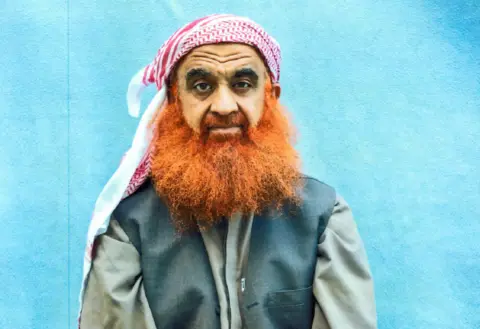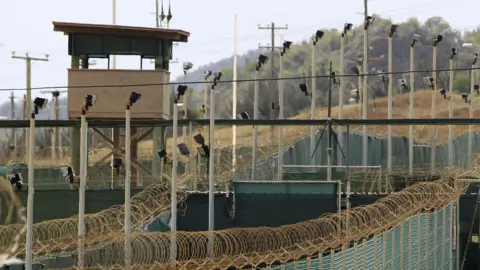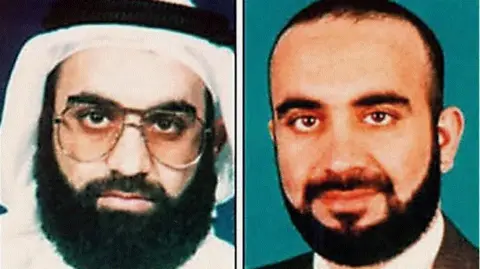 Photo courtesy of Khalid Sheikh Mohammed's legal team
Photo courtesy of Khalid Sheikh Mohammed's legal teamThe US government has succeeded in temporarily preventing the alleged mastermind of the 9/11 terrorist attacks from pleading guilty amid a dispute over the terms of a pre-trial agreement.
Khalid Sheikh Mohammed and two co-defendants reached a deal last summer to plead guilty to all charges in exchange for not facing the death penalty.
In a filing with a federal appeals court, the government argued that it would be irreparably harmed if the pleas were accepted.
A three-judge panel said they needed more time to consider the case and stayed proceedings. They stressed that the delay “should in no way be construed as a judgment on the merits” of the case.
 Reuters
ReutersIt comes after a military judge and appeals panel rejected an earlier move by Defense Secretary Lloyd Austin Withdraw the contractwhich was signed by a superior officer appointed by him.
About 3,000 people were killed in the September 11, 2001 attacks, when hijackers hijacked airliners and crashed them into New York's World Trade Center and the Pentagon outside Washington. Another plane crashed in a field in Pennsylvania after passengers fought back.
The three men have been in US custody for more than 20 years, and pre-trial hearings in the case have dragged on for more than a decade.
Arguments focused on whether evidence was tainted by torture of defendants in CIA custody after arrest.
After his arrest in 2003, Mohammed was subjected to 183 simulated dunks, or “waterboarding,” while incarcerated in a secret CIA prison. Other so-called “enhanced interrogation techniques” include sleep deprivation and forced nudity.
Families of some of the victims of the 9/11 attacks criticized the agreements for being too lenient or lacking transparency, while others saw them as a way to move complex and long-running cases forward.
Those visiting the US naval base at Guantanamo Bay, Cuba, to watch Mohammed plead guilty, were speaking to reporters when news of the delay was announced.
“The US government has failed the 9/11 family again. They had an opportunity to do the right thing and chose not to,” said Tom Resta, whose brother, sister-in-law and their unborn child were killed in the attack.
 Getty Images
Getty ImagesThe government argued that going ahead with the deal meant “it was denied the opportunity to seek the death penalty against three accused of a heinous act of genocide that left thousands dead and shocked the nation and the world”.
“A brief delay to allow this court to examine the merits of the government's request in this important case would not materially prejudice the respondents,” it said.
In their response, Mohammed's party said the deal provided “the first opportunity for real closure” in nearly a quarter of a century. It said the plea negotiations, which took place over two years, “had the White House directly involved”.
In its decision Thursday evening, the federal appeals court said its decision was aimed at giving jurors time to receive a full briefing and hear arguments “on an expeditious basis.”
The delay means the matter will now fall to the incoming Trump administration.
The full details of the deal reached with Mohammad and his two co-defendants have not been released.
At a court hearing at Guantanamo on Wednesday, his legal team confirmed that he had agreed to plead guilty to all charges.
If the agreements are upheld and the pleas are accepted by the court, the next step is to appoint a military jury, known as a panel, to hear the evidence at the sentencing hearing.
In court on Wednesday, it was described by lawyers as a form of public trial, where survivors and family members of victims would be given a chance to speak.
Under the agreement, families will also be able to ask questions of Mohammed, who must “answer their questions fully and truthfully”, lawyers say.
